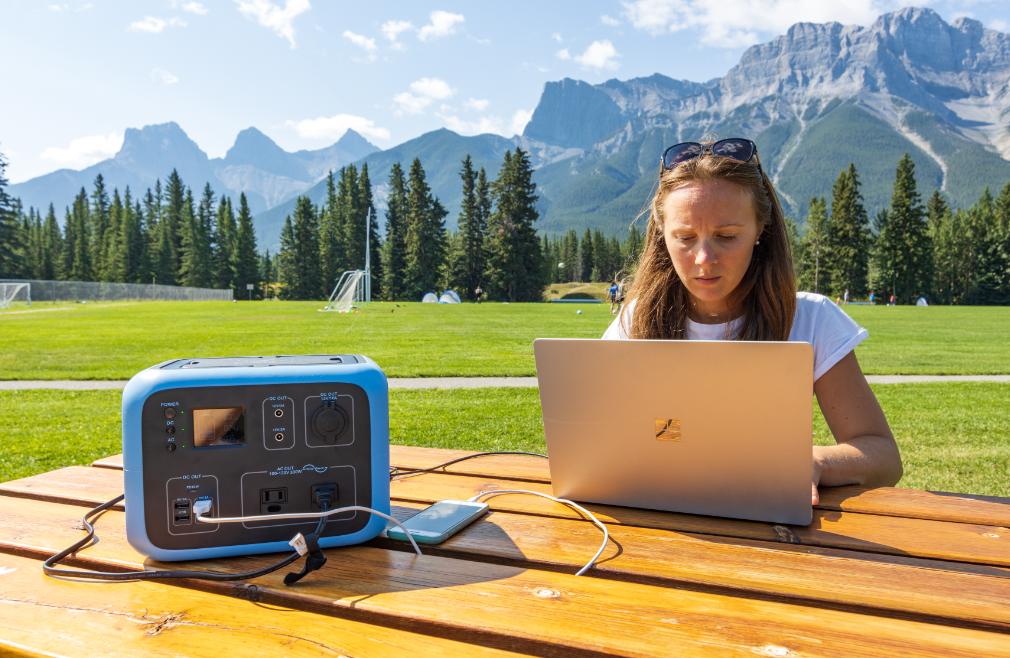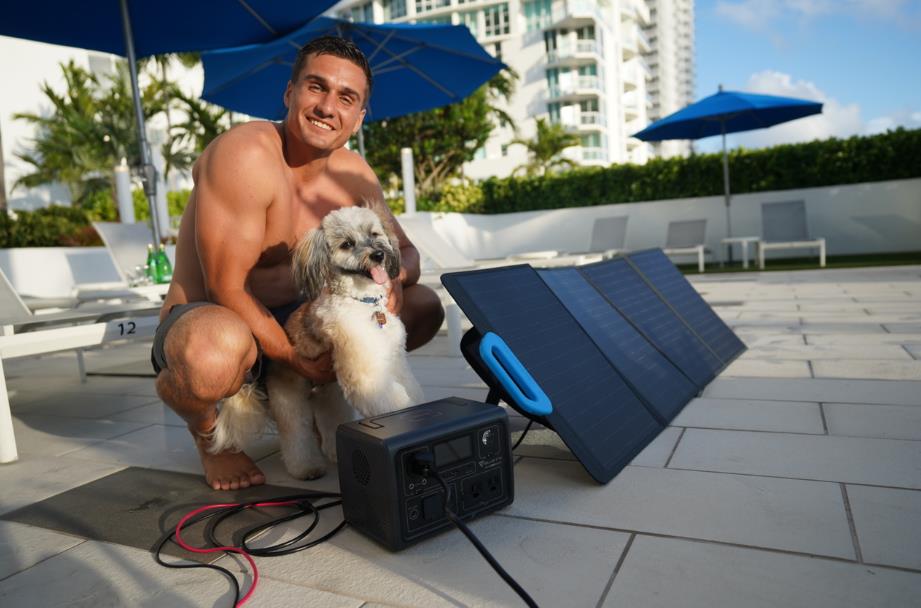
Solar power has captured the mind of millions of people and its popularity is fast growing. This rapid increase in popularity, however, has compelled many to question whether this technology has downsides as well.
To help you understand this technology better, this article will walk you through the major pros and cons of solar generators in addition to what portable solar generators are and how they work. So, without further ado, let's dive in!
Portable Solar Power – What Is a Portable Solar Generator?
To put it simply, any system that generates electricity using only sunlight can be defined as a solar generator. In this context, any energy system connected to solar panels can be called a solar generator, such as a roof-mounted solar panel system.
However, when most people use the term "solar portable generators" or simply "solar generators," they refer to a transportable energy storage unit or power station that uses solar panels to charge itself, among many other ways. Knowing this, we can conclude that portable solar generators are transportable energy storage systems that run off of portable solar panels.
A solar generator, as opposed to ordinary batteries, consists of multiple components, all packed within a single body. The components include an inverter, a battery, portable solar panels, and a charge controller. Similar to a battery; however, solar portable generators do not require any professional installation and can be installed anywhere.
This makes portable solar generators the perfect option for people who are looking for a mobile and reliable power generation source to power their RV, off-grid cabin, or anything of the sort. These systems are also great for keeping your home charged up during blackouts and power outages.
Portable Solar Power - How Do Solar Generators Work?

To better understand the pros and cons of solar generators, it is important that you first understand how they work, don't worry; we'll make it as simple for you as possible.
As mentioned before, there are several components that go into making a portable solar generator, all of which are interconnected through a network of electrical wiring. The energy generation process starts with portable solar panels. The panels contain solar PV cells, which convert the incident sunlight into electrical energy. Since solar cells do not rely on varying magnetic fields to generate electricity, as gas generators do, the electrical output from solar panels is DC.
The energy generated by the solar panels flows into the charge controller through the wiring. External factors such as partial shading or varying sunlight can instill fluctuations in the electrical output from the solar panels. These fluctuations can damage the components that follow, such as the battery.
The charge controller is, therefore, used to regulate the voltage of the current that flows to and from the battery. This prevents the battery from overcharging and over-discharging, in doing so, it helps minimize the deterioration of the battery and extends its life expectancy.
Next follows the solar battery that is used to store the power produced by your solar panels. The battery allows you to stock up on reserves of electrical energy, which you can use at a later time. For instance, at night, when your solar generator is inactive and, therefore, is not generating any electrical energy.
Most solar systems, portable as well as fixed ones, employ lithium-ion batteries owing to their longer life expectancy, superior energy density, and deeper discharges. After the battery comes the inverter. Knowing that solar panels produce DC electrical energy, the output from solar panels cannot be directly used to power your appliances and gadgets since most of them were designed to run only on AC energy. Therefore, an inverter is used to convert the DC output from your panels to AC before running it through to your electrical outlets.
Solar generators generally have boxy designs that include multiple ports such as type-C and type-A USB ports, DC outlets, AC outlets, cigarette lighters, and more. This allows you to power several devices at any one time.
The Advantages of Using a Solar Portable Generator
1. Free Energy
When comparing the pros and cons of solar generators to those of gas-powered generators, we can immediately see that one of the biggest benefits of a solar generator is that it essentially gives you free energy.
A gas generator uses an engine to generate electricity and the engine, of course, needs fuel. As such, with a gas generator, you have to bear the expense of fuel and also the hassle of carrying it around with you everywhere you go. The money you will spend on gas over the years will grow up to be quite a substantial amount.
A solar generator can help you save this amount since this energy generation system uses nothing but natural sunlight to generate electrical energy and, therefore, gives you completely free electricity. All you need to do is to set up your system in a spot with a good amount of sunlight and press the power button. No more having to buy expensive gas and carrying it around; instead, you enjoy free and clean energy instantaneously.
2. Greater Convenience
People often fail to notice the added convenience that solar generators offer you as compared to gas generators. Due to their portable designs and lightweight constructions, portable solar panels can be quickly and easily set up outside, and you can have your solar generator system up and running in no time.
In contrast, gas generators are usually heavy and bulky, even more so when you fill them with gas. As such, loading and unloading them from your RV or car and starting them up can be a very taxing task, something you definitely don't want to deal with.
It's also important to keep in mind that some fossil fuel-powered generators come with a recoil start feature, which requires you to pull on the recoil cord in order to start up the machine. When compared to pressing a button, as is with a solar generator, it is far more inconvenient.
3. Easier Maintenance

One of the biggest benefits of solar generators over their gas-powered alternatives is that it requires little to no maintenance. This benefit makes portable solar energy not only more convenient; it also makes these systems financially more feasible over the long run.
All gas generators consist of a variety of moving and stationary components such as shafts, pistons, spark plugs, etc. In order to maintain the efficiency of your generator and extend its lifespan as much as possible, all of these parts require regular maintenance or replacement.
For instance, the lubricant (engine oil) between the moving parts has to be regularly replaced to reduce friction between the parts to a minimum. Spark plugs, air filters, and oil filters are some other parts that need to be replaced or cleaned from time to time as well.
Not to forget, you’ll have to refill the generator with fuel, probably before each trip. The cost of fuel, maintenance, and labor will add up to a very significant amount over the years.
In contrast, since solar generators do not contain any moving parts, they require almost no maintenance compared to gas generators. As a matter of fact, the only maintenance required to keep your solar generator system in excellent shape is to clean and wash your solar panels once every six months at the least.
The best part is that cleaning portable solar panels is easy enough for you to do it yourself without needing the assistance of a professional. This means that you won’t have to pay any labor costs. Overall, going solar for your off-grid living or trips can save you a large amount of money on maintenance, labor, and fuel costs. This money can, instead, be used to finance your future trips or other off-grid gear you may need.
4. Long-Lasting
All machines, solar or gas-powered, have a finite lifespan, after which the machine becomes incapable of facilitating the needs of the owner. However, the lifespan of no two machines is the same, and needless to say, the longer a machine lasts, the better return it offers for your investment.
Solar portable generators generally have a lifespan of 25 to 35 years. This, however, does not mean that your solar generator would cease to function after this much time has elapsed. Instead, this means that the efficiency of your system will have fallen below a certain level, usually 80% of its initial value. This entails that your system will now generate less power and, therefore, may not be able to satisfy your energy needs.
In comparison, portable gas generators generally have an average life expectancy that ranges between 2000 and 3000 hours. Let’s assume that your generator will be running for 500 hours each year (less than 2 hours a day). This translates to a life of 4 to 6 years. Not to forget, your generator will also require countless replacements and repairs throughout its life.
In light of this information, we can see that a solar generator will last you at least three times longer than a gas generator. In other words, you would have to replace your gas generator three times in the time a solar generator would last you. This again makes solar generators a much more economical option compared to gas generators.
5. Noiseless and Odorless
The sole reason people like to go on off-grid trips is to get away from the metropolitan noise and pollution. In this regard, a gas generator can be a very counterintuitive approach since this machine tends to produce quite a bit of noise and polluting emissions and can take away from the peace and quiet you want to achieve.
Solar portable generators, on the other hand, are renowned for their noiseless and odorless working. These systems do not have any dynamic parts, and neither do they burn any fuel. Because of this, they can produce energy without any noise or harmful emissions. This is a major plus point for all off-grid enthusiasts.
6. Eco-Friendly
Carbon emissions released from the combustion of fossil fuels have been and still are a major contributor to the deteriorating health of the environment and the accelerated climate change. It goes without saying that using gas generators can only worsen the problem, seeing as how they also run on fossil fuels and release harmful carbon emissions.
Solar generators, on the contrary, work solely on sunlight and do not produce any emissions and, therefore, are a perfect eco-friendly and sustainable means of power generation. As such, by going solar, we can help mitigate climate change and restore the planet to its healthy state.
7. Non-Toxic
Among the emissions released by a gas generator, a very toxic gas called carbon monoxide is also present. This is an odorless and colorless gas that cannot be detected by humans and can cause deprivation of oxygen in the human body. If inhaled in copious amounts, the gas can even prove to be lethal. Solar portable generators, of course, do not produce this toxic gas since they do not run on fossil fuels. This makes solar generators a safe and healthy power generation source.
Disadvantages of Solar Generator
It would be difficult to talk about the pros and cons of solar generators without discussing the disadvantages of this technology. While no system in the world is perfect, portable solar generators, it seems, are nearly there.
This is because there aren't many downsides to this technology, and the downsides this technology does have already have readily available solutions for them. For instance, the biggest shortcoming of portable solar generators is that they cannot produce energy after sundown. However, this problem has already been resolved by adding a battery to the system. The battery stores energy during the day when the system is active and allows you to use the stored energy after dark.
Another problem with these systems was that they were sensitive to temperature changes. Extremely hot temperatures would lead to rapid degradation of the battery. However, improved materials, insulation, cooling systems, and construction of modern batteries have fixed this issue.
In light of this, we can safely say that there aren't major disadvantages of solar generators and that it is a worthwhile investment through and through. Making it a superior option to gas generators both economically and environmentally.






































































